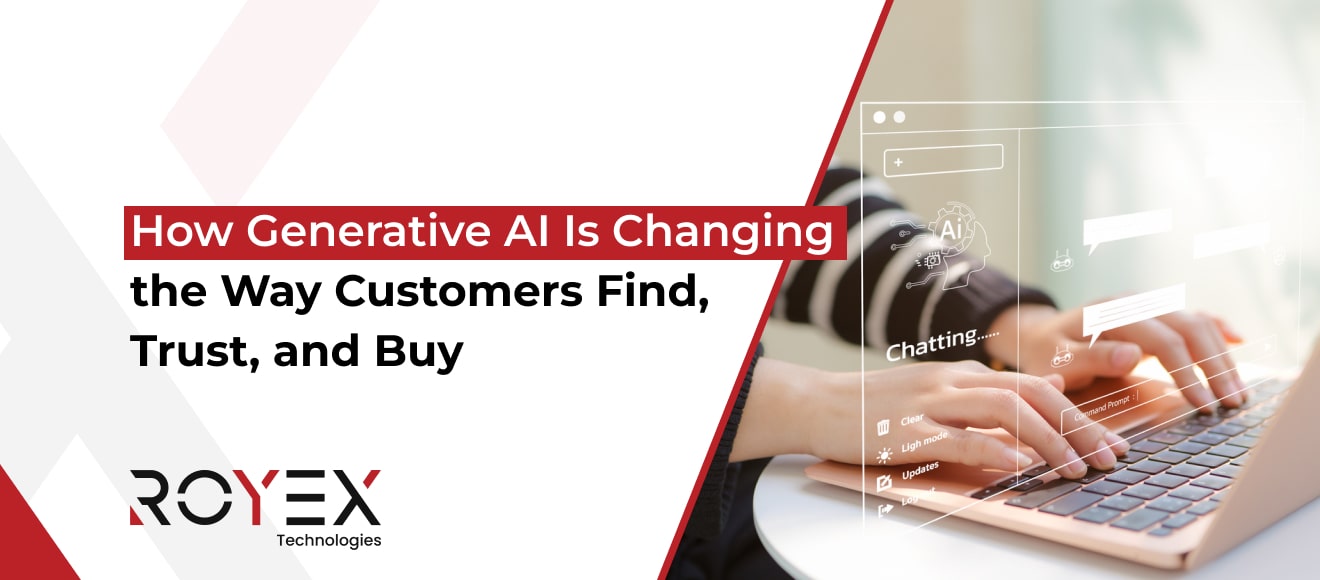
How Generative AI Is Changing the Way Customers Find, Trust, and Buy
The way customers discover products, evaluate brands, and make purchasing decisions is undergoing the biggest transformation since the birth of the Internet. For two decades, marketing has revolved around SEO, social media, and ad-driven funnels. But the rise of Generative AI—tools like ChatGPT, Gemini, and Perplexity—is upending that playbook.
Today’s consumers no longer sift through ads or scroll pages of search results. Instead, they ask questions, get personalized answers, and act based on AI recommendations. This shift is quietly rewriting the customer journey—from awareness to purchase—and redefining how trust and loyalty are built in the digital age.
Let’s explore how Generative AI is changing the way customers find, trust, and buy, with data, expert opinions, and actionable insights on what businesses should do to stay ahead.
The Old World: Search, Click, and Compare
For years, the customer journey followed a predictable path:
Discovery:
People searched Google for information (“best laptops 2024,” “top interior designers in Dubai”).
Evaluation:
They opened multiple tabs, compared reviews, checked star ratings, and read blogs.
Action:
Once convinced, they filled a form, visited a store, or clicked “buy.”
This was the SEO and social era. The brand’s visibility depended on:
-
Keyword ranking
-
Ad budget and CTR
-
Backlinks and reviews
But this process had friction. Users had to spend time comparing conflicting opinions, dealing with ads and misinformation, and often feeling overwhelmed by too much content.
Then came Generative AI—and it changed everything.
The New World: Ask Once, Get the Perfect Answer
Generative AI has turned discovery into conversation.
Instead of browsing links, customers now ask:
-
“What’s the best smartwatch for fitness tracking under $400?”
-
“Which Dubai web development company is best for AI-powered websites?”
-
“Show me alternatives to Shopify for UAE e-commerce.”
ChatGPT, Gemini, or Perplexity instantly analyze thousands of sources and reply with:
-
Summarized recommendations
-
Citations and brand comparisons
-
Pricing and pros/cons
Users no longer need to “research” — they get personalized insight instantly.
According to an Adobe 2025 study:
-
77% of ChatGPT users treat it as a search engine
-
36% discovered a new brand or product via ChatGPT
-
30% trust AI-generated recommendations more than search results
This new behavior means AI answers are now the first impression of your brand.
Finding Through AI: Discovery Becomes Conversational
Generative AI has replaced keywords with intent.
Instead of typing “best affordable drone UAE,” users now ask:
“I’m looking for a drone to shoot videos for my real estate business in Dubai. Any recommendations?”
AI understands the context—profession, purpose, budget, and region—and delivers tailored suggestions.
Key shifts in discovery:
-
From pages to answers: Users get results directly, often without visiting a website.
-
From generic to personalized: AI tailors recommendations by goals, location, and history.
-
From SEO to AEO (Answer Engine Optimization): Visibility now depends on how often AI cites your brand.
Gartner predicts that by 2026, 25% of traditional search traffic will be replaced by AI-driven discovery.
That means the new competition isn’t for “page one of Google”—it’s for inclusion in AI’s trusted answer set.
Trust Through AI: Confidence Comes from Conversation
In the old model, trust came from reviews, influencers, and repetition.
Now, it comes from AI credibility.
When users ask questions, AI systems:
-
Reference verified sources
-
Highlight consistent facts
-
Weigh brand transparency and accuracy
If your brand’s content is clear, cited, and verifiable, AI is more likely to include you in its answers.
According to Pew Research (2025), 62% of consumers say they “trust AI-curated answers” as much as traditional reviews—especially when those answers include source citations.
The new trust equation:
Authority + Transparency + Context = AI Citation = Trust
Example:
When users ask “best fleet management system in UAE,” AI doesn’t list ten ads. It finds sources that explain features, pricing, use cases, and compliance, and cites those pages.
Brands like Royex Technologies—which provide structured, transparent information about their solutions (e.g., Fleeto, EYAANA)—stand a higher chance of being included in AI-generated answers.
This form of trust is algorithmic: once earned, it compounds. The more AIs cite you, the more credible you become—both in human and machine eyes.
Buying Through AI: The New Decision Engine
The final transformation is in how customers buy.
Generative AI doesn’t just recommend—it now executes actions.
Users can already:
-
Ask ChatGPT with browsing to find a product and click directly to purchase
-
Use Gemini integrated with Google Shopping to buy items
-
Get Perplexity’s affiliate links with real-time price comparisons
The purchase journey is collapsing into a single interaction:
“Find me a smartwatch that monitors heart rate, works with iPhone, and costs under $300.”
→ ChatGPT recommends Apple Watch SE and Garmin Venu Sq.
→ User clicks on a cited link → Purchase complete.
That’s not search. That’s transaction.
According to McKinsey’s 2025 “AI in Commerce” report:
-
41% of consumers say AI directly influenced their recent purchase decisions
-
28% completed at least one transaction that started from an AI prompt
This means AI isn’t a top-of-funnel tool anymore—it’s the funnel itself.
Expert Voices on the Shift
Let’s hear what industry leaders are saying about this revolution:
Sundar Pichai (Google CEO):
“Search will change profoundly as AI transforms the way people seek and engage with information.” (The Verge, 2025)
Bill Gates:
“In the near future, you won’t visit websites to compare—you’ll have an AI agent that finds, summarizes, and orders on your behalf.” (GatesNotes, 2024)
Satya Nadella (Microsoft CEO):
“We’re entering the agent era—where AI will mediate between people, data, and business decisions.” (Bloomberg Tech, 2025)
Aravind Srinivas (Perplexity CEO):
“The future of search is indexing for AI—not for people. The web is becoming a knowledge graph for machines.” (TechCrunch, 2025)
Each of these statements points toward one undeniable truth:
Generative AI isn’t an add-on to search—it’s the new foundation of discovery and commerce.
How Businesses Should Adapt
To thrive in this new AI-first landscape, businesses need to rethink marketing, content, and conversion strategies around AEO (Answer Engine Optimization) and AI Commerce.
✅ Step 1: Optimize for AI Discovery
-
Structure your content with FAQ, HowTo, Product, and Service schema.
-
Publish concise, verified answers to high-intent questions.
-
Keep all stats, features, and prices up to date—AI values freshness.
✅ Step 2: Build Machine-Readable Trust
-
Cite credible sources in your own content.
-
Be transparent about pricing, certifications, and case studies.
-
Publish data that AI can quote easily (numbers, benchmarks, lists).
✅ Step 3: Prepare for AI Commerce
-
Ensure your product pages are AI-accessible (clean HTML, fast load, descriptive titles).
-
Add clear buy/CTA links in every summary.
-
Experiment with AI-integrated shopping platforms like Google Gemini Shopping, OpenAI’s ChatGPT Browse, or Perplexity Pro.
✅ Step 4: Monitor AI Mentions
-
Regularly test prompts like “best [your product category] in [region].”
-
Track when and where your brand appears in AI answers.
-
Measure AI-driven leads separately—they tend to convert faster.
The Numbers: Generative AI Adoption & Impact
Let’s look at the data driving this transformation:
| Source | Key Statistic | Year |
|---|---|---|
| Adobe 2025 Survey | 77% use ChatGPT as a search engine | 2025 |
| Gartner Forecast | 25% decline in search engine volume by 2026 | 2025 |
| McKinsey Report | 41% of consumers say AI influenced their last purchase | 2025 |
| Perplexity Data | 780 million queries in May 2025 (+20% MoM) | 2025 |
| OpenAI | ChatGPT handles 2.5 billion+ prompts daily | 2025 |
| Pew Research | 62% trust AI-curated answers as much as reviews | 2025 |
These numbers make one fact clear: Generative AI is not the future of discovery—it’s the present.
The Future: AI as Your Customer’s Personal Advisor
Imagine a world where every customer has a personal AI assistant—trained on their preferences, budget, and buying habits.
-
The assistant researches for them
-
Filters brands based on trust
-
Negotiates offers
-
Even books or buys automatically
That’s not science fiction—it’s already happening.
Platforms like ChatGPT with GPTs, Gemini Agents, and Amazon Rufus are evolving into autonomous purchase advisors.
In this world, your brand’s visibility depends not on ads—but on your data, authority, and accessibility to AI.
Key Takeaway: AI Is the New Word of Mouth
Trust used to spread through people.
Now, it spreads through machines trained to think like people.
Your next buyer might not read your blog, but they’ll read what ChatGPT says about you.
They won’t Google you—they’ll ask an AI agent.
If that AI mentions you, cites you, or recommends you, you’ve already won half the sale.
The brands that understand this shift early—optimizing for answers, citations, and credibility—will own the next era of online commerce.
References
- Adobe 2025 Generative AI Study: “How People Use ChatGPT for Search” – Adobe Blog
- Gartner 2025 Forecast: “AI Agents to Replace 25% of Search Volume by 2026” – Gartner.com
- McKinsey 2025 Report: “AI in Commerce: How Generative Models Reshape Consumer Behavior” – McKinsey.com
- Pew Research 2025: “Public Trust in AI and Information” – PewResearch.org
- OpenAI Data Insights 2025 – OpenAI Blog
- Perplexity Growth Update (May 2025) – TechCrunch
- GatesNotes (Bill Gates, 2024): “The Age of AI Agents”
- The Verge (2025): “Sundar Pichai: Search Will Change Profoundly”
- Bloomberg Tech (2025): “Satya Nadella on the Agent Era”
Final Thought
Generative AI has blurred the line between marketing and decision-making. The next decade belongs to brands that don’t just get found, but get trusted and recommended by AI.
Your website won’t just be your shop—it will be your data source for intelligent systems.
And those systems will decide what millions of customers see, believe, and buy.
The future of marketing isn’t about visibility. It’s about credibility—powered by Generative AI.





